|
With the onset of winter chills - and I'd say they've come rather quickly this year - joint pain becomes more of a problem. I've had a few clients recently with joint pain and for the first time, after 20 years of practicing reflexology, I find that my fingers are sometimes a bit sore. So I decided to do a bit of research about osteoarthritis and here it is:
What is osteoarthritis? Osteoarthritis (OA) causes joints to feel stiff and painful. It's the most common form of arthritis and is more common in older people. Symptoms of OA can vary: joints, especially finger joints can become swollen and change shape; sometimes the joints make creaking or cracking noises; sometimes there is pain, but not always; sometimes moving the joint can be difficult; the joints can lose surrounding muscle and this can make them feel weaker. Almost all joints can develop osteoarthritis but the most common places are the fingers, thumbs, knees and hips as well as the low back and neck. What causes osteoarthritis? No-one knows exactly what causes osteoarthritis. It used to be called wear and teat and was thought to be part of the ageing process, but now it's thought that it may be due to: repeated small injuries that happen as part of daily life and which don’t heal completely; an after effect of sporting injuries; genetics (it can run in families); being overweight which puts extra strain on the weight-bearing joints, especially the knees and hips. Inside the affected joints there is quite a lot of healing and repair going on: cartilage - which acts as a shock absorber - is lost and new bone is formed which can cause joints to change shape. This formation of new bone can contribute to some of the pain and stiffness. Can we do anything about osteoarthritis? I would highly recommend having a look at the Arthritis Research UK website, from which most of this information has been gleaned. I spent a lot of time looking at research papers, particularly for natural remedies for osteoarthritis and I have to say the Arthritis Research UK website provided the most complete and useful information for a non-scientific readership. The website provides information for Osteoarthritis, Rheumatoid Arthritis and Fibromyalgia. I'm disappointed to note that Reflexology is not one of their listed complementary therapies - it's my belief that the relaxation provided by Reflexology can help dampen down inflammation, relieve pain to some degree and stimulate the body's own healing resources. From my research the following supplements may help: Omega-3 Fish oil provides an anti-inflammatory effect which is well documented and provides benefits for osteoarthritis as well as supporting heart health. As part of my Reflexology continuous professional development I sat in on a nutrition webinar by Marilyn Glenville. Her professional view of supplements was to be very careful and do lots of research - fish oil quality can depend on the process of extraction, the type and part of fish used (fish liver is likely to be the most toxic part of the fish) and the quality control of the company. Also look out for the GLA (y-Linolenic acid) There is some evidence to suggest that Borage Seed Oil also helps fight inflammation and improve pain and swelling (https://academic.oup.com/rheumatology/article/42/5/652/1784589). This paper compiled the results of a number of studies to determine the benefits (or not) of a range of herbal remedies in treating Osteoarthritis and Rheumatoid Arthritis. Capsaicin Capsaicin is extracted from chilli peppers and can be effective in reducing pain and tenderness in affected joints. There seem to be no major side effects although when applied topically it can cause skin blisters and must be kept well away from eyes, mouth and open wounds to avoid irritation.. It's available on prescription in the form of gels, creams and plasters. Most trials have used either 0.025% or 0.075% of capsaicin gel applied to the skin four times a day. SAMe S-adenosylmethionine (SAMe) is a chemical compound found naturally in your body and laboratory studies suggest that it has some painkilling activity and stimulates cartilage production. As yet there's insufficient research to be clear how SAMe works. It's available as a nutritional supplement, but mostly from US suppliers. Side-effects, which are usually mild and infrequent, include: nausea; restlessness; headaches; a dry mouth; stomach upsets. SAMe can also increase the activity of antidepressants and severe side-effects of anxiety and mania have also been reported in people taking anti- depressants. People on anticoagulants, you should take SAMe under a doctor’s supervision because it might increase the risk of bleeding. It's unclear what's the best dose of SAMe is, but most studies have used daily doses of 400–1,600 mg. Frankincense Indian frankincense is an Ayurvedic remedy that can be purchased over the counter in capsule form. It can prevent the production of inflammatory substances in the joints. Current evidence, based on four RCTs, suggests that it might have some beneficial effects in treating participants with osteoarthritis of the knee which might last for a period of time after treatment is stopped. It prevents the production of hormone-like substances in your body that act as triggers for joint inflammation. Trials have used a daily dose of 1g which seems to be safe, but studies are not extensive and interactions with outer medications haven't been well studies. High doses have been shown to have a serious effect on the liver. Frankincense can also be used topically by mixing the "pure essential oil" (ideally organic) with a carrier oil (jojoba) or unscented body lotion and rubbing it on the affected part to reduce pain and inflammation. But beware, essential oils can be extremely powerful and a little goes a long way. Frankincense oil can also be used in a bath. Frankincense oil should not be used by people taking anticoagulant medications and may cause minor skin rashes, nausea, stomach pains (and in my case too much gives me a headache). If you're going to try any of these remedies, I'd strongly suggest you try them one at a time and do your research. Supplements vary in quality and efficacy - and of course price - and if you try more than one at a time and get a benefit (or no benefit) you'll not know which one worked or if they cancelled each other out. Most of these remedies have an anti-inflammatory effect and I don't know if too much anti-inflammatory is a bad thing. This link provides more information about Capsaicin, SAMe and Frankincence:https://www.arthritisresearchuk.org/arthritis-information/complementary-and-alternative-medicines/cam-report/complementary-medicines-for-osteoarthritis.aspx And of course, I'd definitely recommend that you give Reflexology a try because you never know, although it's not listed in the research, it might just work for you! You can book a treatment here: http://www.lothianreflexology.co.uk/book-a-treatment.html
0 Comments
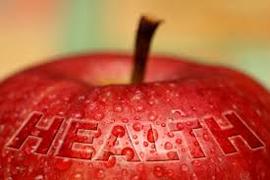 I've decided to take my own advice this month and banish winter tiredness by doing less - such as writing an original blog. After all, why reinvent the wheel! So, here's some great advice from the NHS on how to stay healthy this winter ..... "It may be cold outside, but winter needn't be the unhealthiest time of year for you and your family. Here are five ways to make sure that, even when your body is telling you to hibernate, you can keep healthy and fit, no matter what the weather's like. Banish winter tiredness Many people feel tired and sluggish during winter. This is due to the lack of sunlight, which disrupts our sleep and waking cycles. Try these tips:
Eat more fruit and veg When it's cold and dark outside, it can be tempting to fill up on unhealthy comfort food. However, it's important to ensure you still have a healthy diet and include five portions of fruit and veg a day. If you find yourself craving a sugary treat, try a juicy clementine or satsuma instead. Winter vegetables such as carrots, parsnips, swede and turnips can be roasted, mashed or made into soup for a comforting winter meal for the whole family. Explore varieties of fruit and veg that you may not normally eat. Read more about how to get your 5 A Day. Find recipes for 10 warming hot meals. Drink more milk You are more likely to get a cold in winter, so make sure your immune system is in tip-top condition. Milk and dairy products such as cheese, yoghurt and fromage frais are great sources of:
Read more about milk and dairy foods. Read more about healthy eating. Try new activities for the whole family Don't use the cold winter months as an excuse to stay in and lounge around. Instead, get out with the whole family to try out a new activity –maybe ice skating, or taking a bracing winter walk on the beach or through the park. Regular exercise helps control your weight, boost your immune system, and is a good way to break the tension that can build if the family is constantly cooped up inside the house. Read more about different types of exercise for you and your family. Have a hearty breakfast Winter is the perfect season for porridge. Eating a warm bowlful on a cold morning isn't just a delicious way to start your day, it also helps boost your intake of starchy foods and fibre. These foods give you energy and help you feel fuller for longer, stopping the temptation to snack mid-morning. Oats also contain lots of vital vitamins and minerals. Make your porridge with semi-skimmed, 1% or skimmed milk, or water, and don't add sugar or salt. Add a sliced banana, berries or other fruit for extra flavour and to help you hit your 5 A Day target. Get more ideas for healthy breakfasts." And here's the link to the page with the original article: https://www.nhs.uk/Livewell/winterhealth/Pages/Healthywinter.aspx And of course, some Reflexology won't hurt either. To book a treatment go to http://www.lothianreflexology.co.uk/book-a-treatment.html 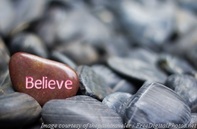 We often think of our health in purely physical terms, but as a Reflexologist, I have a strong view that health also has a mental or psychological dimension. Having a strong belief in our ability to manifest our desires and the means to manage our thoughts can have a dynamic and very significant effect on our mental and physical health. I have a saying on my wall which reads: "There is a difference between wishing for a thing and being ready to receive it. No one is ready for a thing until he believes he can acquire it.” I’m not sure where it came from or who said it, but I do think that our beliefs have a vital impact on our results. Does your belief support you desires and aspirations? Do you really believe that it will all happen for you some day or do you think it will never happen for you? Go inside yourself for a moment and ask yourself just how strongly you believe that you will be able to achieve your dreams and goals Give yourself a score of 1 – 10 where, 1 = not very strongly at all and 10 = 100% certainty. If your score is less than 10 then you need to work on your belief. To create a strong belief you need three things: 1. To know that it is POSSIBLE to achieve your objective 2. To know that you are ABLE to achieve your objective 3. To know that you DESERVE to achieve your objective Know it’s possible Everything is POSSIBLE, but you must feel that it is possible for you, at this moment. You cannot prove a negative, therefore you can never prove that you are incapable of anything, you can only say that you have not achieved it YET. Do not be too quick to decide what is impossible. Know you are able Avoid putting limitations on what you think is possible. Do you have an age beyond which you think something will be impossible? Do you think you are less likely than friends your age to be able to achieve your golas? These beliefs are arbitrary judgements you have made about yourself and they are just as likely to be WRONG as they are to be right. Banish them, completely, NOW. Keep an open mind. Be positive in your thinking. And open yourself up to the abundant possibilities on offer. Know you deserve it Do you deserve to realise all your dreams and aspirations? If you don’t feel you deserve it, why not? Do you have a belief system that says: things need to be difficult to have value; or you never get what you really want; or everyone is better and more deserving than you; or bad things happen to good people? If your health would benefit from a boost why not try a Reflexology session, because if you don't give it a try, you'll never know what benefits you may get from the treatment. If you'd like to know more about Reflexology click here. 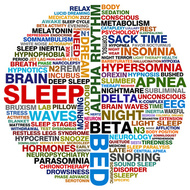 As a Reflexologist, I always ask clients about their sleep patterns, because a good night's sleep is so important to general well-being. And better sleep is often one of the additional benefits of a Reflexology treatment as the majority of my clients report having had a great night's sleep after a treatment. The Harvard Women’s Health Watch suggests six reasons to get enough sleep: * a good night's sleep can help learning and memory; * chronic sleep deprivation may cause weight gain by affecting the way our bodies process and store carbohydrates, and by altering levels of hormones that affect our appetite; * insufficient sleep can lead to poor performance and accidents; * sleep loss may result in irritability, impatience, inability to concentrate, and moodiness; * serious sleep disorders have been linked to hypertension, increased stress hormone levels, and irregular heartbeat; * sleep deprivation alters immune function, including the activity of the body’s killer cells. Here are ways to get a better night's sleep: 1. Have a sleep routine Going to bed and waking at the same time (even at weekends) helps to improve your ability to sleep and the quality of that sleep. Avoid evening naps by keeping active until bedtime. 2. Get out into natural light Long days in the office under artificial light can make your brain sleepy, while hours in front of a TV or computer screen can suppress the body's production of melatonin, making it harder to sleep. Get out during the day - walk to or from work or go for a walk at lunchtime - even in winter when light levels are poor, this will help your sleep patterns. The exercise you get from your walk will also help you sleep better at night. 3. Make sure your bedroom is sleep friendly Keep your bedroom cool and well ventilated. Keep your bedroom dark - use blackout blinds or a mask to keep light out. Have your bedroom as quiet as possible, and if you can't avoid noises from neighbours or barking dogs, use soothing sounds or earplugs to mask external noise. And, of course, make sure your bed is comfy. If you wake with a sore back or aching neck it may be a sign that you need a new mattress or a different pillow. 4. Prepare for bed Have a bedtime routine: as well as brushing your teeth and getting ready for bed, incorporate relaxing activities into your bedtime routine: try doing a 15 minute relaxation, or some gentle yoga exercises. To allow you to be totally relaxed, empty your head: write down all the things that you want to do tomorrow, or anything that is worrying you, or anything that you need to think about, or anything that you need to remember to do. Get it all down on paper, so there's nothing for your mind to chew on as you try to get to sleep. 5. Eat yourself sleepy For a better night's sleep avoid big meals and fatty food late at night, alcohol, caffeine, and smoking all of which will disrupt sleep patterns. If you find yourself waking at night for a snack, try having a light snack before bed - a handful of almonds or a couple of oatcakes with half a banana, honey, a slice of turkey or cheese may help keep your blood sugar stable throughout the night. You might also want to have a cup of chamomile tea or a glass of warm milk. 6. Get rid of anxiety If worry keeps you awake at night, this is may be a stress problem, not a sleep problem and you need to address the source of your worry. You may benefit from meditation, or you may need to learn how to manage your thoughts, or perhaps enrol on a stress management course. If it's a problem and you're not sure what to do for the best, go to your GP for advice. 7. Try a Reflexology treatment Sometimes it's nice not to have to do everything yourself, so consider getting support from a Reflexology treatment. Many clients talk about getting a great night's sleep after a treatment - it's almost as it a Reflexology session has the effect of pressing a reset button in the body. That's not to say that you won't need to take action yourself, but you know what they say about a problem shared is a problem halved! If you're experiencing poor sleep and would like to try Reflexology to discover if it will help, click this link to email me and ask about my special discount for new clients. Wishing you sweet dreams. Maximise your fertility, naturallyHave you been trying to conceive for 12 months or more, without success?
Are you confused by all the conflicting information on the internet? Would you like to feel more supported with your efforts to get pregnant? Fertility Support Workshops
Sign up for a series of 6 Fertility Support Workshops: Only 10 places available When: Mondays 7.30-9pm on: 22 Sept, 6 Oct, 20 Oct, 3 Nov, 17 Nov, 1 Dec 2014 Where: The Sir Arthur Conan Doyle Centre 25 Palmerston Place, Edinburgh How Much: £15 per session Book: Contact Doris Wylie on 07724 197627 or email [email protected] Doris Wylie Lothian Reflexology www.lothianreflexology.co.uk 07724 197627 www.facebook.com/lothianreflexology 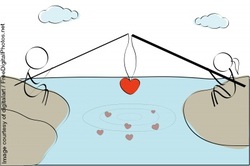 If you'd like to conceive, I'd ask you to look at all the highs and lows of your fertility journey. I know you'd do anything to get pregnant, so I'd like you to ask yourself ... are you trying too hard? Trying might not be a useful thing to do, in fact it may actually hinder all your best efforts, because trying is about : endeavour, difficulty, becoming annoyed – or so the dictionary says. Trying is all about chasing after your dream rather than waiting to receive it. Trying is all about forcing your heart's desire into being rather than allowing it to materialise in it's own good time. Trying is about control rather than being in a state of flow. Are you chasing your dream of having a baby rather than being ready to receive with open arms? May I suggest that this might not be the best strategy. And here’s why ... Imaging you were to go fishing. If you were to go fishing, you’d pack your kit – everything you need to land that prizewinning fish. You’d pick the perfect spot where you know the fish are likely to be. You’d set your bait and cast your line and then you’d sit back and relax and wait for the fish to bite. And while you’re waiting for the fish to bite you’d likely just enjoy being out in the fresh air, in the peace and quiet, giving yourself time to settle and release, and letting your worries and cares wash away. What you wouldn’t do is: jump into the car with no equipment. Then stop at any old spot without checking first to find out how the fishing was. And race into the water fully clothed, trying to catch the fish with your bare hands! That would just be ridiculous, wouldn't it? The very act of “trying”, creates a level of stress that is more likely to take you away from what you want instead of closer to it. You effectively create obstacles that wouldn’t otherwise exist as a consequence of your desire to increase your chances of getting pregnant. You begin to get in your own way! Can I just say that again, "You begin to get in your own way"! This is not always an easy concept to process when your sole goal in life is to get pregnant, so please give it some thought. May I suggest that you might choose to let go, stop "trying", chill and just wait for the fish to bite. And if you need some help with your fertility journey, check out how Fertility Reflexology could help. If you want more tips like this, you’ll find them in the Free Baby Making Mindset Club, just go to https://www.facebook.com/groups/1422257428013810/ 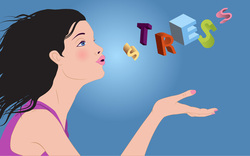 The International Stress Management Association launched their 2008 National Stress Awareness Day with their top ten stress busters:
Pick one items from the list and put it into practice and see how well it works for you. Or you could come for a relaxing Reflexology or Indian Head Massage and let someone else take the strain for a change. Just call Doris on 07724 197627 to book your appointment. And remember there's a special JULY OFFER: £10 off your first treatment - but only if you book in July (appointments can be scheduled for August).  Hypnotherapy, affirmations, the law of attraction, NLP, positive thinking, the Silva Method - there's a long list of modalities and techniques that claim to be able to help you think positively and be able to manifest whatever you want, just by using the power of your brain. So you want to be wealthy, healthy or happy - just think yourself so. It may not be quite as simple as that, but it's most people would recognise that a strong focus and a positive attitude will be more likely to get you towards your goal more quickly. And it's not just goals that can be influenced. It's claimed that mental images produce changes in the body on a physical, chemical and immunological level that can affect health. What you see in your mind’s eye can change specific immune system responses that may affect such things as white blood cell count. It may sound a bit far fetched, but there is beginning to be some research to suggest that this might be so. Visualisation is taught to people undergoing cancer treatments or suffering from anxiety or depression. Guided imagery – more often known as visualisation – is an important tool in influencing a variety of health problems. It provides benefits and poses virtually no risk. The principle is that vivid imagery sends messages from the cerebral cortex to the lower brain. From there the message is relayed to the endocrine and the autonomic nervous systems, which affect a wide range of bodily functions, including heart and respiration rates and blood pressure. And visualisation can also be used to improve personal performance: it’s a way of programming your brain (and body) to help achieve the required outcome. Athletes place as much importance on mental preparation before an event as they do on physical preparation. It's a really simple process and since you can't stop thinking, you may as well direct your thoughts to a more specific outcome. Why not give it a try yourself.....
And talking about focus, I'd just like to remind you that I have a special JULY OFFER: £10 off your first treatment of Reflexology or Indian Head Massage, so please help me spread the word. This offer is only available for treatments booked in July, so don't delay. To book just call Doris on 07724 197627. |
|

